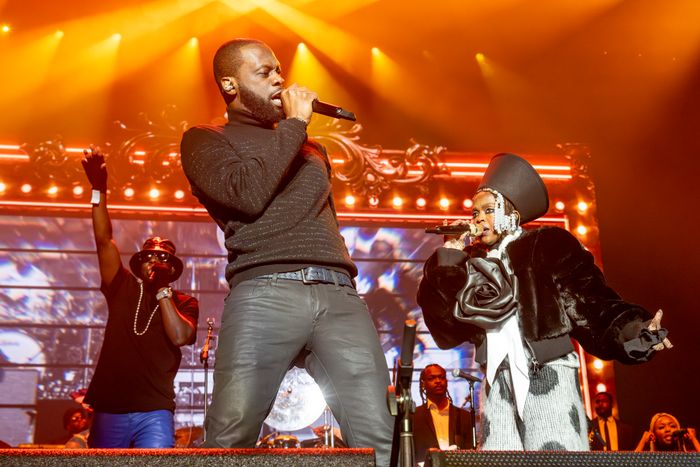
“I’m on Team Pras,” declared David Kenner, Pras Michel’s former attorney, on the witness stand in a courtroom hearing called earlier this month specifically to test the veracity of that claim. “I did not think he should have been convicted. I hope he is granted the retrial he seeks,” he said. With Judge Colleen Kollar-Kotelly looking on dispassionately, Kenner faced withering questions from Michel’s new attorneys about his performance during the artist’s monthlong trial last spring.
If you were a Grammy-winning hip-hop star facing 20 years in prison on charges that you’re a secret agent of the Chinese government, you’d probably hope none of your lawyers would ask if they can work from home. You’d hope! But during his trial last year, the founding member of the Fugees was unaware that Kenner was outsourcing nearly all of the case work to a medical malpractice lawyer in Minneapolis who didn’t attend the trial because he refused to leave behind his two adopted pit bulls, Kirby and Marney.
The malpractice lawyer, Bill Maddix, referred to the rescued pups as his “associates” and insisted that not only did the dogs have no one else to care for them — “They’re kinda aggressive,” Maddix told me after the hearing — but he would be more productive if he worked from home. Kenner urged him to make the trip, but it was futile. “He wouldn’t come,” Kenner explained on the witness stand. “He had the pit bulls.”
But nine months after Michel was convicted on a sprawling white-collar criminal indictment, the pit-bull drama was one of the more harmless revelations from the three-day evidentiary hearing called by Kollar-Kotelly in mid-January. Michel’s new lawyers with the Washington, D.C., power firm ArentFox Schiff have filed several motions advocating for a retrial, but Kollar-Kotelly focused on one argument in particular: that Kenner had so egregiously underperformed in so many ways that he violated Michel’s constitutional right to effective representation.
The fact that she called such a granular hearing at such a delicate time — Michel has been touring with his old bandmates Lauryn Hill and Wyclef Jean even as he awaits sentencing — indicated that Kollar-Kotelly found some of the arguments against Kenner to be credible.
“She’s a careful and smart and fair judge,” said Paul Pelletier, a former Justice Department prosecutor who has followed the case closely. “Calling this hearing was the fair thing to do, given what she observed during trial.”
At this month’s hearing, four witnesses, including Kenner, testified about his unorthodox work process and a litany of decisions he made that seemed to undermine his client’s defense. What emerged was a picture of a veteran workaholic attorney with a storied Los Angeles career (Kenner has litigated roughly 500 trials since 1968) whose management of Michel’s complex case could at best be described as overconfident and improvisational, and at worst self-dealing and deceptive.
Kenner arrived on the case with street cred in the hip-hop community and a reputation as an effective consigliere to the biggest names in ’90s West Coast rap. Tupac Shakur, Snoop Dogg, and Suge Knight had all turned to him over the years as a fixer. (In 1996, Kenner won Snoop an acquittal on murder charges; the two have been close ever since.) But D.C. is a long way from Hollywood, and despite a work ethic that often kept his younger colleagues scrambling to keep up, it was evident at the trial last year and the hearing this month in Washington that Kenner had lost a step and made questionable decisions, oftentimes without Michel’s input.
Michel’s new lead counsel, Peter Zeidenberg, examined Kenner on the stand for more than five hours on January 10, demanding explanations for his mystifying strategies handling the former Fugee member’s case. Why did it take more than a year to file his first motion? Why did he bring two lawyers onto the case with near-zero criminal litigation experience? Was it helpful when he incriminated Michel in the first sentence of his closing statement? Why did he recite factual inaccuracies from a buggy artificial intelligence bot in his closing statement? Following Michel’s crushing, ten-count conviction, why did a company registered at Kenner’s law office put out a joint press release touting the bot’s success at Michel’s trial?
Hovering above all of these questions was the very human and unavoidable issue of Kenner’s health. After a fall in September 2022 that sent him to the emergency room and left him with several injuries and doctors’ orders to refrain from work, Kenner moved to delay the trial, acknowledging in a sealed statement “his inability to provide effective assistance of counsel.” Though he submitted this to the court along with his medical records, at no point did Kenner tell Michel about the extent of his injuries. “The hearing established that Kenner was clearly overmatched and the grave consequences of that fact,” said Pelletier.
To all of these facts and allegations about Kenner’s missteps, the Justice Department made one simple rebuttal. “Unsuccessful is not the same as ineffective,” said prosecutor Nicole Lockhart about Kenner’s performance.
Judge Kollar-Kotelly is expected to choose from a narrow range of options when she issues her ruling in the coming weeks. She could deny Michel’s motions and proceed with sentencing him. She could grant Michel a retrial. Or, behind door No. 3 lies the mysterious world of plea-bargain negotiations. Nearly four years after his first indictment, if Michel is willing to admit guilt where he believes there is none, maybe the Justice Department will loosen its hold over the rest of his life.

